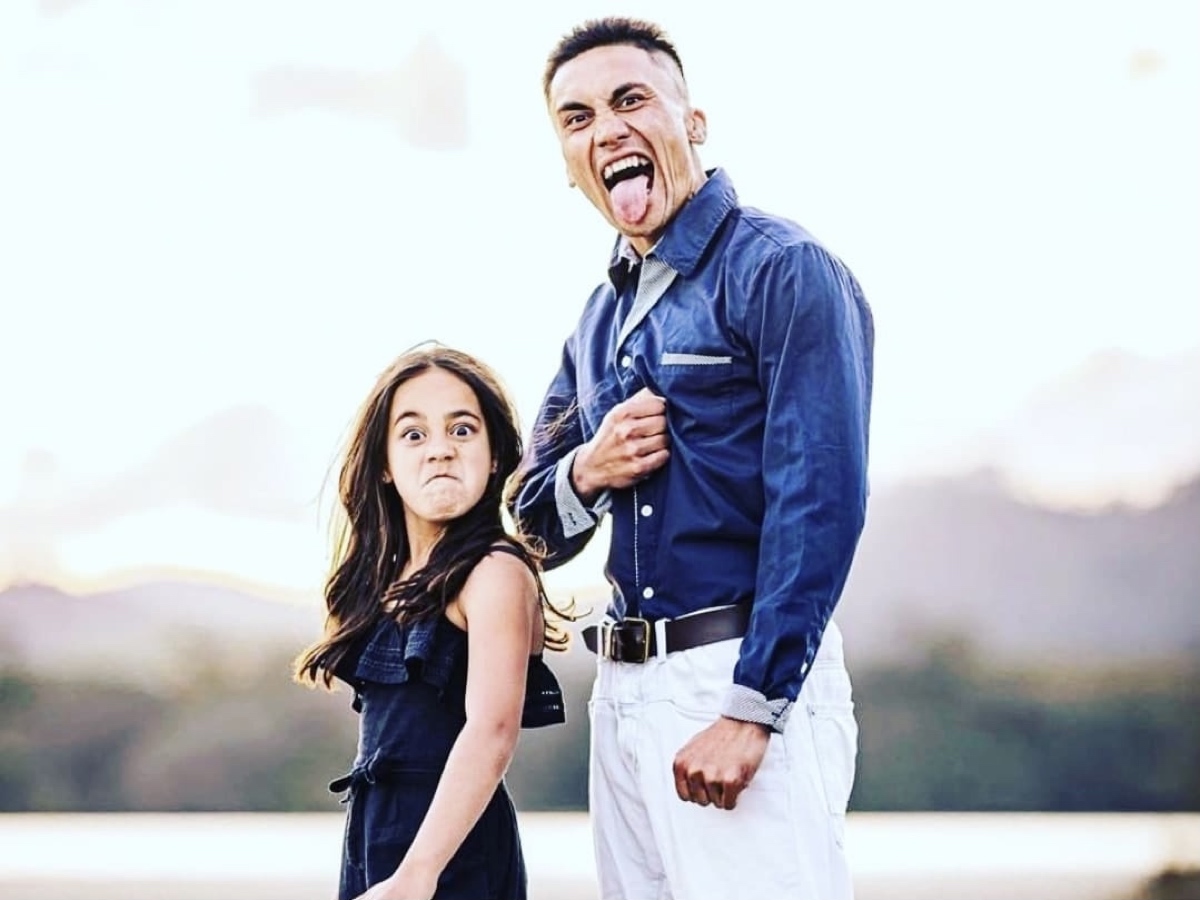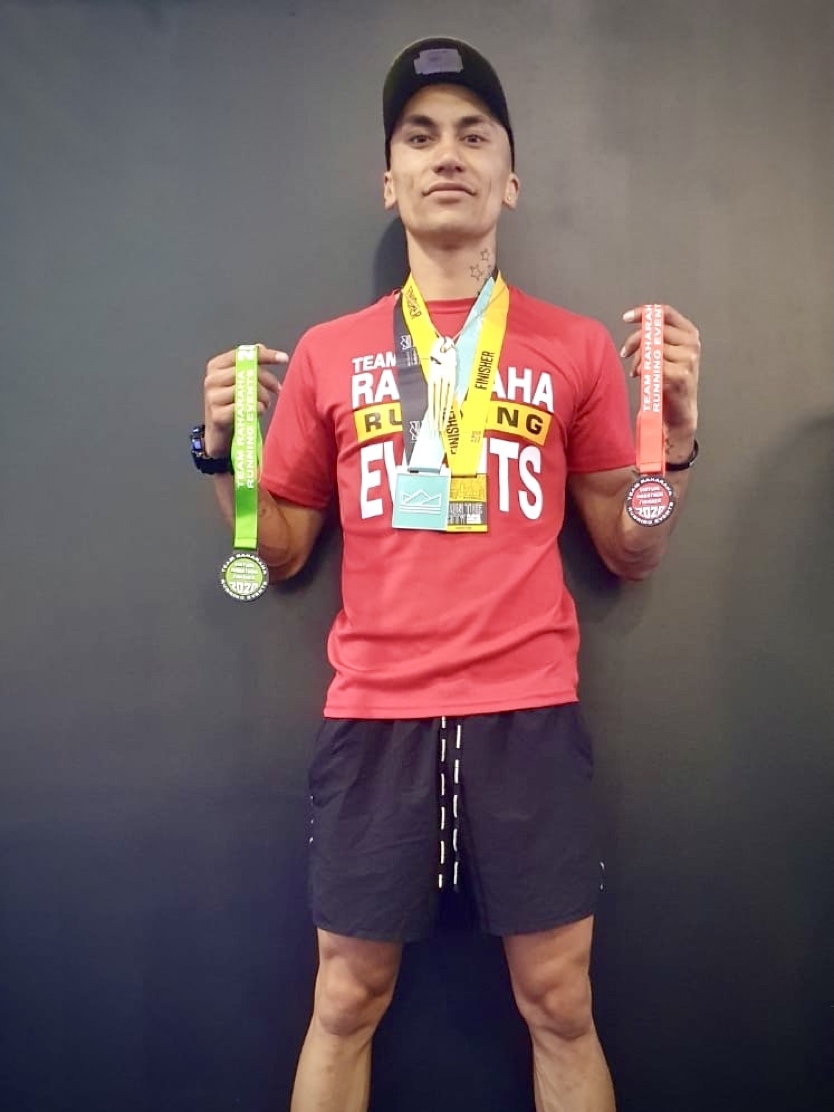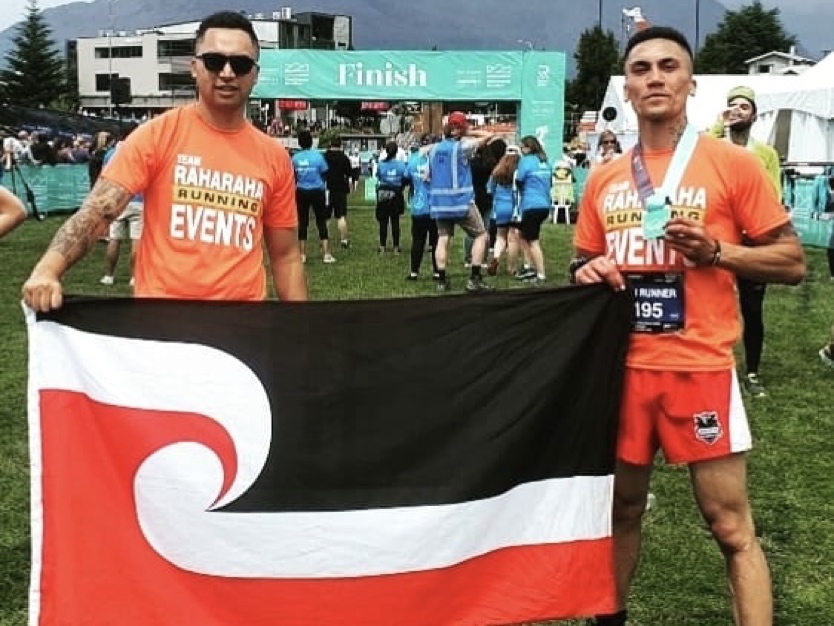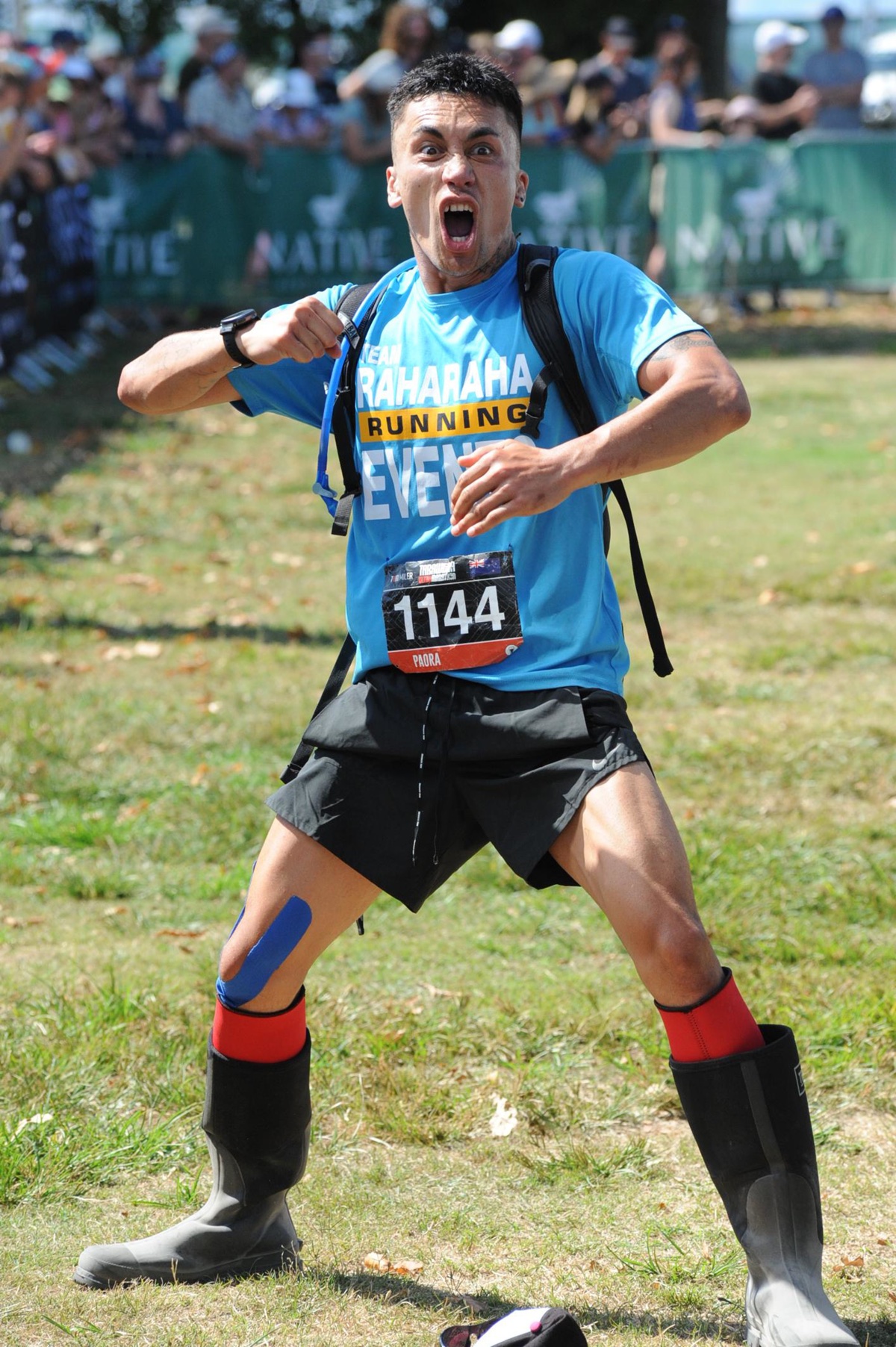Māori ultrarunner Paora Raharaha says that his resilience comes from the trials of his younger days. Explains Raharaha, “If people who are in dark places come out, then they can go a long way. After going through a lot, these people are quite strong and mentally tough, and capable of doing anything. My past helps me with my running.”
Raharaha gained national attention in New Zealand earlier this year when he completed the 2021 Tarawera Ultramarathons 100 Mile wearing a pair of gumboots and doing 10 burpees for each of the race’s 160 kilometers—that’s 1,600 burpees! This was his inaugural 100 miler, and he was doubly motivated by the challenge of the distance as well as to raise awareness and financial support for an important cause.
“I really loved the environment of the 100 miler. It was one of the best events I’ve been to. The people were awesome, both the runners and race volunteers. At every aid station they did 10 burpees with me! It was so funny. We got to the finish line and I had to do 10 more. They said, ‘Do you have more in you?’ I said, ‘Let’s do 20!’ It wasn’t as hard as I thought. I was looking for something that was going to push me.”
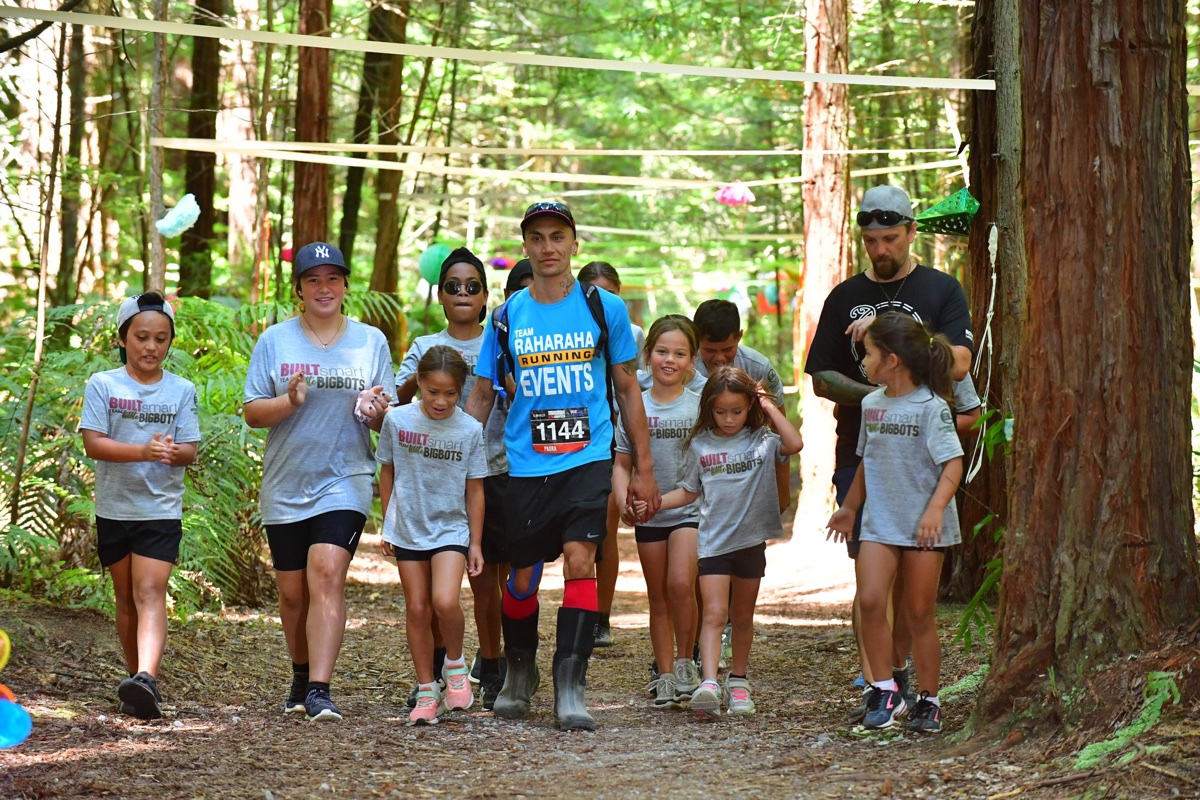
Paora Raharaha in gumboots and with members of the Huntly Team Little Big Bots on the 2021 Tarawera Ultramarathons 100 Mile race course. Photo: FinishePix
Raharaha, who lives in a small town called Paeroa on the North Island of New Zealand, first considered wearing gumboots when his mate Jack Keys was racing the 2020 Auckland Marathon to fundraise money for a cancer charity. Raharaha jumped in to help, also running the event in the clunky footwear. As if running wasn’t enough of a challenge, he also did 25 burpees every kilometer.
“When I finished [the Auckland Marathon], I thought the experience was pretty cool and I wanted more. That’s when I thought, I could do this for a 100 miler,” he says. About two months later, he finished the 100-mile distance at Tarawera in 35 hours and 39 minutes. “I was cutting the cutoff times quite narrow. I ended up making the finish line 21 minutes before the final cutoff,” he says.
He says he got one blister around 26 miles, which “went away,” and another when he switched into a different pair of gumboots around mile 76, which was painful for the remainder of the race. Otherwise, his feet felt fine.
Raharaha fundraised $12,270 New Zealand dollars for the Huntly Team Little Big Bots, which helps teach physical fitness, positive self-esteem, and community to kids around ages five through 12. “My friend Ants Pitman is the coach and trains the kids for running events. He feeds them and they’ll train before and after school. They’ll stay at his house. Adults will help with the cars to go to running events. His main thing is, that by training kids, it will keep them out of the lifestyle we lived,” he says.
Here’s Raharaha crossing the 2021 Tarawera Ultramarathons 100 Mile finish line with members of Huntly Team Little Big Bots. His supporters are greeting him with a haka, a Māori ceremonial dance, and he replies just before crossing the finish line:
Raharaha is based on the North Island in New Zealand and was born in a small town called Te Aroha, in 1992. The now 28-year-old got involved with stealing when he was a kid; it began with chocolates and lollipops as a six-year-old. His criminal career evolved into burglaries and stealing guns as a teenager. He was processing a lot of grief from losing his brother to alcohol poisoning, had a ton of energy, and got addicted to the lifestyle.
“I ended up doing aggravated robberies and assault with firearms. When my brother passed away, things got heavier. I was frustrated, sad, depressed, anxious. I think that played a big part in me going to prison. I was in a lot of pain growing up, and I ended up assaulting people. I was actually full on. I went to prison at 18 years old,” he says.
Around this same time, he finished high school and was also pursuing professional rugby, the sport he played growing up. He tried out for the New Zealand Warriors, a professional rugby league football club based in Auckland that competes in the National Rugby League. He’d also just had a baby girl.
But that all changed in 2011 when he was sentenced to 1.5 years in prison. Two months after his release in 2012, he was incarcerated again, this time for four years. He was released in 2016 at age 23.
He served time at multiple prisons, because he continued to get into trouble on the inside, too, and he’d be moved to new locations. “I met a lot of great men that were inside, even though we were all mischievous back then. I also had good family support [while I was in prison]. They would send me phone cards and money to buy food and visit me,” he says.
He’s not been back to jail since 2016. Today his biggest motivations to stay out of the crime lifestyle are his family and a feeling of freedom. “It’s beautiful and good to leave my old life behind and be here with my daughter… I missed her second through sixth birthdays… and family and all the things you can’t do when you’re in prison. My freedom is my motivation to change things, and the biggest thing is my family and mainly my [now] 11-year-old daughter, Hineira Omai-lei Pio-Ainsley. She needs a father figure around. To support my siblings and my family and my parents. My uncles and aunties, cousins, because I love them all dearly. That’s definitely my biggest motivation to keep doing what I’m doing.”
Raharaha’s family is Māori. As the indigenous Polynesian people of New Zealand, “Māori have been in New Zealand for a very long time. They’re the first people to be here, before everyone else came on,” he explains and shares more about their customs and language, te reo. “We have a tribe, and there are also sub-tribes that we are affiliated to. A waka, which is like a canoe, is what our ancestors used to go fishing and when we went to war, we used that. We are associated with a few marae, which is a meeting house, where they have funerals and birthdays.”
Despite his family’s unconditional support, it was difficult to adapt to life outside of prison after spending so much time there. “I loved it until the last six months of my second prison sentence. It’s weird because there’s a ‘it doesn’t feel like I’ve been here’ prison mentality. Because I was around a lot of guys who shared similar upbringings, I felt really comfortable. The problem with prisons is that people are in and out of them and there are statistics about people getting released after two years and the majority go back.”
He continues about life after prison, “But on the outside, you get to eat and drink whatever you want to, walk out your own door, see the sun when it comes out and stars—little things we can take for granted if you haven’t been in that situation before. We can Zoom call. Drive a car. Plant plants. You can do so many things: all the things I appreciate about my freedom.”
When he was released the second time, instead of crime, he poured his energy into intellectual and physical goals. He has studied tourism and travel hospitality, for which he earned the New Zealand Diploma in Tourism and Travel in 2020; personal training, and business and money management. Altogether he earned five qualifications. He launched a gym, became a motivational speaker, and recently started race directing for running events. He also trains youth and works full-time as a caregiver for a boy with autism. He picks up his daughter three to four times a week. Usually he takes her swimming, to gymnastics, skating, or simply relaxing.
Raharaha’s first fundraiser race—the 2017 100k Trail Trilogy Hauraki Hundee Ultra—was for a neighbor who had cancer. His third and upcoming event in gumboots will be a 211-kilometer (131.1-mile) distance at a 100k event in May. Raharaha got approval from the race director to start early, so that he can finish his goal distance. About the unusual 211k distance, he says, “It is five marathons. I want to see if I have what it takes to go the distance.”
He’ll fundraise for the I Am Hope charity, founded by Mike King—an acclaimed mental health advocate, television personality, and former comedian—which supports mental health initiatives and May is mental health awareness month in New Zealand. “This run is about raising awareness for mental health overall. So, a lot of people in New Zealand will wear gumboots on that Friday, the day the race starts,” he says.
Gumboot Friday is a nationwide initiative, launched by I Am Hope in 2019, that asks kiwis to wear gumboots on the first Friday in April each year. Having depression is like walking through the mud in gumboots, the organization says, and donning the boots is a fun way to spark a conversation around mental health while raising money, too. All donations are used to support counseling for young people ages five to 24. In 2019 and 2020, the initiative fundraised two million New Zealand dollars, which funded 15,500 counseling sessions.
Thereafter, he’ll take a break to weight train in the gym for six months. Ahead, he wants to train for an Ironman in gumboots. “I think it’ll be easier, and I’ll be quite stable with the biking and I might get away without blisters,” he says. He’d also like to complete a 1,000-kilometer route in gumboots near his home, which he’ll most likely finish by running various loops on a mix of roads and trails. He says, “All my runs will be fundraiser runs. I try to do it for groups and individuals that the money can go straight to.”
He’ll also continue to teach people and youth why it’s better to stay out of trouble. He says, ”In general, I give talks about my upbringing, where I was, where I’m at now, and what I plan to do in the future. A lot of times I share about my troubled life and why people shouldn’t go down that way, because I know what it’s like.”
“Most adults are living with a lot of stuff within their hearts,” he says in the video below, produced by New Zealand’s 1 NEWS. “I believe if they can forgive and let go, they’ll be able to lead a more prosperous life. They’ll be more happier. They’ll be free.”
